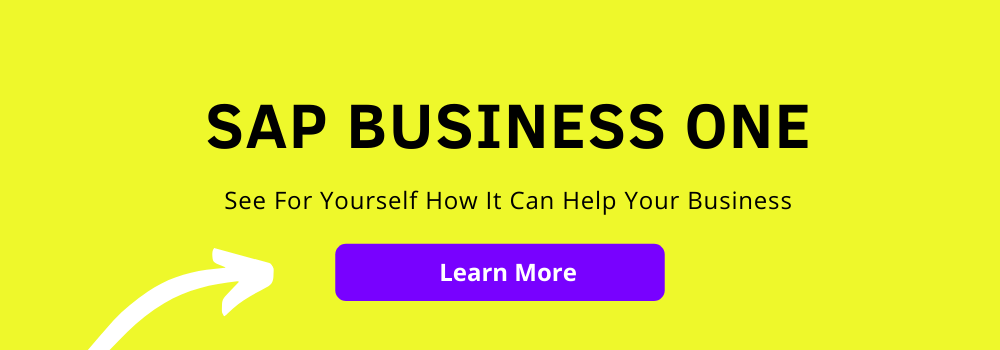In today's competitive business environment, choosing the right ERP system is critical for driving efficiency, enhancing decision-making, and fostering scalability. While both SAP Business One and Odoo cater to small and medium-sized businesses (SMBs), SAP Business One consistently proves to be a superior choice for organizations seeking a robust, reliable, and integrated system.
In this blog post, let’s begin by understanding what both solutions offer, and potential hidden costs associated with Odoo for users.
What's Odoo?
Odoo is an open-source, modular business management software designed to streamline processes across departments. It offers a range of applications for various needs, including:
Finance: Accounting, invoicing, and expense tracking
HR: Recruitment, employee management, and time-off tracking
Sales: CRM, POS, and subscription management
Services: Project management and scheduling
Supply Chain: Inventory, manufacturing, and quality control
Marketing: Social media, email campaigns, and event planning
Websites: E-commerce, blogging, and live chat
Overview of Odoo software. Source: Odoo
With its flexibility and affordability, Odoo suits small businesses, startups, and industries needing a tailored, all-in-one solution.
What's SAP Business One?
SAP Business One is a robust Enterprise Resource Planning (ERP) solution designed specifically for small and medium-sized businesses (SMBs) but with enterprise-level capabilities.
Quick introductory video on SAP Business One; Source: SAP Business One
SAP Business One can value-add your business by offering:
- Financial Management : automates accounting and banking tasks
- Inventory and Purchasing Management: real-time stock management and purchase planning
- Sales and Service Management : centralized lead tracking and customer support
- Business Intelligence: customizable reports and analytics
Known for its strong financial, inventory, and manufacturing capabilities, SAP Business One is ideal for small and medium-sized enterprises (SMEs) in industries with rigorous operational and financial requirements, such as distribution, manufacturing, wholesale, retail, and professional services.
Odoo VS SAP Business One - Uncovering Potential Hidden Costs
Odoo is good for those just starting out, with its affordable monthly pricing model. However, when comparing Odoo with SAP Business One, it's important to consider the potential hidden costs that could arise from customization(s), access to support, security, market position and scalability.
|
|
Odoo |
SAP Business One |
|
Customization |
Require internal developer expertise/ external consultants Over-customization can lead to upgrades issues |
Managed by SAP-certified consultants |
|
Access to Support |
Free community edition lacks support, upgrades, and hosting. Support available only for Odoo's paid Standard and Custom plans |
Free community support, with direct support to customers Backed by a vast global network of SAP partners and consultants. |
|
Security |
Vulnerable to potential security risks due to Odoo and its database (PostgreSQL) open source model May not meet enterprise-grade security and compliance standards for highly regulated industries Over-customization could pose security risk |
Strong security control, data protection, and compliance features Uses Microsoft SQL Server and SAP HANA database Ideal for companies in regulated industries |
|
Market Position |
Relative new player in market Potential consideration on Odoo's long-term viability, changes to business strategy / discontinuation of features |
Founded in 1972, a leader in the ERP industry. SAP Business One is backed by backed by years of SAP experience and R&D |
| Scalability |
Scale well but may require technical adjustments, additional modules or customizations |
Scalable; equipped to handle large datasets or complex operations |
In this section below, we'll explore these potential hidden costs to help you make a more informed decision.
Customization
As an open-source platform, businesses may need to customise Odoo in meeting specific business needs. If your company does not have in-house technical or developer expertise, this can lead to higher costs and reliance on outside consultants – with the risk of them making mistakes on the custom codes or not adhering to industry’s best practices.
There is also the possibility of over-customization that could potentially disrupt core software features. This may lead to longer implementation timelines, bugs, and operationality issues and errors. Also, upgrading to newer Odoo versions could sometimes break customizations or require significant effort to ensure compatibility, leading to downtime or additional costs.
For SAP Business One, while customizations may involve additional costs, they are managed by SAP-certified consultants. This ensures the system operates seamlessly to meet your unique business needs.
Access to Support
Although Odoo comes with a free, community edition, it does not offer functional support, version upgrades, and hosting options for this version. This means businesses may need to upgrade to the paid, enterprise edition for better support.
Also, keep in mind that the quality of third-party apps can vary significantly, and some may lack proper documentation or long-term support.
In addition, for Odoo, some aspects are still being developed, such as backwards compatibility and users that upgrades to newer versions may discover that what works before – be it previous processes or routines, may not be applicable after the upgrade and require some re-learning or training. This was unlike SAP Business One, where it supports backwards compatibility for its users.
Meanwhile, SAP Business One offers dedicated support channels, backed by a vast global network of SAP partners and consultants. As a 7-time Top SAP Business One Gold Partner, our AFON team can work with you to maximise your investment in SAP Business One's capabilities.
Security
As with any open-source software like Odoo, there is always a concern on security. Open-source code is publicly accessible, which can make it vulnerable to hackers. Cybercriminals may exploit open-source software by creating access points, potentially compromising systems and causing downtime or revenue loss. In addition, even though it is secure, it may not meet the enterprise-grade security and compliance standards for highly regulated industries.
SAP Business One offers robust security, data protection, and compliance features, which are especially crucial for companies in regulated industries such as pharmaceuticals, manufacturing, and finance. For SAP Business One, SAP Adaptive Server Enterprise (ASE) is used to authenticate and access control mechanisms for authorized users. Additionally, data encryption provides further protection against theft and security breaches.
Market Position
Odoo, originally released as TinyERP in 2005, has quickly developed into a comprehensive and flexible suite, recognized for its modular architecture and active community support. Over time, it has grown to provide both on-premises and cloud-based solutions, swiftly adapting to emerging technologies and user demands. Nevertheless, when compared to SAP, Odoo remains relatively new in the market. Hence, possible considerations may include the long-term viability of Odoo platform, potential changes in business strategy/model, or discontinuation of features.
Meanwhile, founded in 1972, SAP has established itself as a leader in the ERP industry, offering powerful and comprehensive solutions mainly for large enterprises. Over time, SAP has released several versions to address various business requirements, with SAP Business One specifically designed for small and medium-sized businesses. So, rest assured that your SAP Business One investment is backed by years of SAP experience and cutting-edge research & development (R&D).
Scalability
Odoo can scale well but may require more technical adjustments, additional modules or customizations as the business grows. Odoo uses PostgreSQL, a robust database but may not offer the same speed or performance than SAP HANA, in more complex environments. For large set up with massive data (transactions, records, logs), queries may become slower - especially if the database is not properly indexed or optimized. As your business scales, you may require additional modules - of which, there's a possibility not all of them are built with scalability in mind, or with limited capability to handle high traffic or large data sets, causing potential performance issues.
In comparison, SAP Business One offers a more scalable solution and is equipped to handle large datasets or more complex operations. It support both Microsoft SQL Server and SAP HANA database platform. SAP HANA is specifically designed to manage large-scale data operations, and is exceptional in processing high volumes of data. Also, its in-memory computing capabilities greatly enhance scalability and performance.
Question - Which Software To Go For?
%20(1).jpg?width=1000&height=666&name=shutterstock_1396441355_1920_compressed%20(1)%20(1).jpg)
Both Odoo and SAP Business One are powerful solutions, but their suitability depends on your specific goals, budget, and operational needs.
Choose Odoo if: you have an in-house developer and is looking for an open source software for your customizationsDo note that, as an open-source platform, Odoo's code is accessible to everyone. This openness can be a double-edged sword, as vulnerabilities may be exploited if the system is not kept updated or properly secured.
Choose SAP Business One if: you want to adopt best practices and you operate in industries such as manufacturing or sales and distribution, and seek a robust, enterprise-grade ERP solution.
If you’re ready to find out more about SAP Business One, do contact us to learn how we can help you make the transition. Give us a call at +65 6323 0901, or drop us a note here, and our consultants will get in touch with you shortly.




